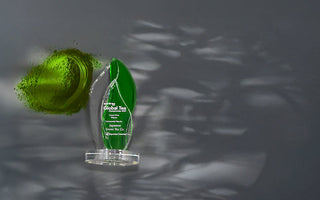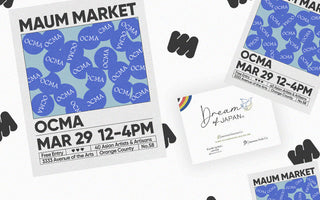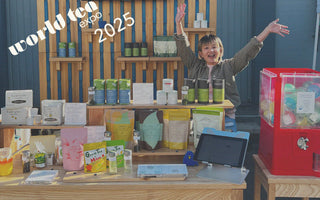Valentine's Day is celebrated in many countries all over the world. If you have been considering surprising someone special (including yourself!) this Valentine, then you are at the right place.
Our team has developed this unique (yet relatively easy, no bake-off contest skills needed!) recipe that you can whip up in your own kitchen with a few readily available ingredients plus our award-winning Matcha.
In today's post, we spill the tea (or Matcha, in this case) on the recipe, sprinkle some pro tips and kitchen hacks, and top it off with intriguing tidbits about how they do Valentine's in Japan. Spoiler alert: intense chocolate company marketing battles from Japan! (Also, note that this recipe is good to be used regardless of whether it is Valentine's or not; please feel free to make it any time of the year!)
Matcha Chocolate Cheesecake Bars
Ingredients:
Crust
- 1 1/2 cup dates
- 2 cup walnuts
- 2 tbsp cacao powder
Filling
- 1 1/2 cup raw cashews
- 1 tsp vanilla extract
- 1 medium lemon, juiced
- 1/4 cup coconut milk (light)
- 1/4 cup coconut oil
- 1/2 cup maple syrup
- 1/4 cup coconut yogurt
- 1 1/2 tsp matcha powder
Instructions
- Soak the cashews in hot water for at least one hour.
- Meanwhile, make the crust by adding the dates to a food processor and pulse until the dates break down into small pieces and form a ball.
- Remove the dates from the food processor and add the walnuts and cacao powder. Blend until the walnuts form a crumble.
- Add the dates to the crushed walnuts and blend. The crust should stick together when pinching it!
- Add the crust to a baking dish lined with parchment paper and place in the freezer for 30 minutes.
- Strain the soaked cashews and add them to a high-speed blender along with the rest of the filling ingredients, except the matcha powder.
- Blend until creamy. Separate ⅔ cup of the mixture into a small bowl. Add the matcha powder and whisk until there are no clumps and matcha is well combined.
- Remove the crust from the freezer and pour in the filling mixture without the matcha. Gently shake the dish so the filling forms an even layer. Add the matcha filling in a swirling motion and use a toothpick or small spoon to swirl it into the first layer.
- Place in the freezer for 1 hour or the refrigerator for 3-4 hours to set.
- Serve with fresh strawberries and enjoy!

We hope you are excited to follow along with our recipe video and start making fresh Matcha chocolate cheesecake bars. But wait a minute before you start putting on your apron; as you might already know, we like to learn new things and explore the back story of everything we do, and if you have the time and are interested, keep on reading to discover some surprising Valentine's facts and traditions from Japan.
Valentine's Day (バレンタインデー) in Japan
Like the rest of the world, Valentine's Day in Japan is about spreading love and showing appreciation for those dear to our hearts. Yet, the Japanese version of this heartfelt Day comes with some unique features, one of the most obvious of them being the fact that the spotlight is on 'Luxury/Handmade Chocolates.'
Chocolates: the undisputed stars of Valentine's Day in Japan!
One of the well-established traditions in Japanese Valentine's Day is to give special and luxury chocolates to romantic interests by women. It is also popular for women to give 'handmade' chocolates to men on Valentine's Day as it shows thoughtfulness and it makes the chocolates 'more special.' Picture female friends coming together on home chocolate-making sessions or perhaps attending Valentine's Day chocolate-making workshops to create those heartfelt, handmade confections. After all, a touch of personal effort makes every chocolate sweeter!
Men Reciprocate their Appreciation a month later, on - "White Day."
While on February 14th, it's mostly on the women to give chocolates, a month later, on March 14th, it's the men's turn to buy (or make) chocolates and gifts for the special women in their lives.
On White Day, a charming reciprocation of chocolates happens: men who were recipients of honmei-choco (本命チョコ, 'chocolate of love') or giri-choco (義理チョコ, 'courtesy chocolate') on Valentine's Day are now expected to reciprocate the gesture by presenting thoughtful gifts to the women (more on the different types of Valentine's chocolates in the next section). This delightful exchange isn't limited to romantic partners; friends and coworkers also partake in the tradition.
Also, a part of the tradition is to follow the concept of Sanbai Gaeshi (三倍返し, 'triple the return'), suggesting that men should offer a return gift valued at two to three times the worth of the Valentine's gift they initially received.
Looking for a White-Day Gift? Check out our artisanal Japanese gifts!
There are Several Types of Valentine's Day Chocolate in Japan
If you are spending your Valentine’s Day in Japan and have no romantic interests, then you still have a high chance of receiving a Valentine's Chocolate; take a look at all the types of Valentine's Day Chocolates in Japan, and you’ll know why. Here are some of the major types of chocolates on Japanese Valentine's Day.
Imagine a chocolate that not only satisfies your sweet tooth but also serves as a hot topic in Japanese social discussions. Enter Giri Choco – the unsung hero of Valentine's Day in Japan. Unlike its romantic counterpart, Honmei Choco, which is reserved for significant others, giri choco is the go-to chocolate for women to give to their male colleagues, bosses, and acquaintances.
It's the chocolate of appreciation and politeness, a diplomatic way to say, "Hey, you're not my Valentine, but you're still pretty awesome." However, this tradition is facing a bit of a slump as gender roles evolve, and many offices are waving goodbye to giri choco with a strict "no gifts" policy. Times are changing, and so are the chocolates!
2. Honmei Choco: 本命チョコ (Chocolate of Love/Romantic/True Feeling Chocolate)
Honmei choco is the pinnacle of Valentine's Day treats in Japan – often handmade by women for their romantic interests. Honmei Choco is usually reserved for people such as husbands, boyfriends, desired partners, secret crushes, etc. Honmei Choco outshines its counterparts in quality and expense.
3. Tomo Choco: 友チョコ (Friendship Chocolate)
Giri Choco's declining popularity has paved the way for Tomo Choco, the epitome of friendship chocolate. Unlike Giri choco, Tomo Choco liberates women and men to exchange chocolates and gifts on Valentine's Day without the confines of company hierarchy, romantic ties, or obligatory returns. Embraced for fostering healthier interpersonal connections, Tomo Choco thrives on mutual appreciation and respect, making it a delightful alternative with less pressure and more genuine camaraderie. 🍫🤝
4. Jiko Choco/ My Choco: 自己チョコ/マイチョコ (Self Chocolate/ Chocolate for Oneself)
Probably the best kind of Valentine's Chocolate – a delightful treat meant for oneself! These days, the act of pampering oneself with delightful things and prioritizing self-care is not just positive; it's actively encouraged. If you've grown weary of buying chocolates for others and waiting for someone else to surprise you, we wholeheartedly recommend making it a dedicated self-care day. It's high time we treat ourselves to a soothing cup of premium Japanese Sencha and create our special Valentine's recipe for ourselves! 🍵🍫
The History of Valentine’s Day Traditions in Japan
There are many theories as to how Valentine's Day started in Japan, and it seems like many big chocolate brands in Japan are fighting to claim that they are the ones who popularize Valentine's Day! The Chocolate battle is fierce in Japan, just like Japan's Coffee Battle! (If you are interested in knowing more about the heated competition in Japan's coffee market, head onto this article)
Valentine’s Day started to become known among the general public around 1958 (Showa 33). However, it was quite different from Valentine's Day, as we know it today in Japan. It came a long way through many ups and downs before reaching its current state.
- Origin:
Foreigners who came to Japan before the Second World War introduced the concept of Valentine's Day to Japan. After World War II, efforts were made by the distribution and confectionery industries to promote the celebration and boost sales of confectionaries. However, it wasn't until the late 1970s that Valentine's Day truly became established and accepted in Japanese society.
- 1936 - Morozoff Confectionery - The Oldest Japanese Chocolates-for-Valentines Advertisement
Morozoff is a prominent luxury confectionery brand in Japan, originating from a chocolate boutique established in Kobe in 1931. Back in the Day, Morozoff Confectionery made waves by featuring an ad in the English-language newspaper called "The Japan Advertiser," urging readers to "Send chocolate to your Valentine (= your beloved one)." This is the oldest advertisement in Japan when it comes to featuring chocolates for Valentine's Day.
It is interesting because our Valentine's Day recipe features Matcha and Cheesecake, and Morozoff, who was one of the first confectionary companies to promote Valentines, is famous for its cheesecakes. Find more interesting Japanese tea-based dessert recipes that you can make with your loved ones here.
- 1958 - Kunio Hara's Involvement:
Kunio Hara is a famous Japanese businessman who worked for the Japanese chocolate giant Merry Chocolate and was given credit for creating advertising campaigns that tied chocolate to Valentine's Day in Japan. Kunio Hara is said to have implemented the idea of women gifting chocolates to men in 1958, creating the catchphrase, "Once a year, it's a day when women can confess their love."
- 1960s
Big departmental stores like Isetan, Seibu, and Matsuya started to promote Valentine's Day to promote sales of gift items and expensive chocolates. For example, Isetan Departmental store held a Valentine's Day fair in 1965.
- 1970s
While department stores initially struggled to make Valentine's Day popular in Japan, it faced a setback after peaking in 1968. With customer traffic declining, many doubted its establishment. However, in the early 1970s, during the oil shock of 1973 and the end of high economic growth, chocolate sales saw a rapid rise. The retail industry, grappling with the recession, became more proactive in marketing. The 1970s marked the completion of Japan's capitalism and its transformation into a mature consumer society.
Around the late 1970s, the ''Japanese Valentine's Day,'' in which girls give chocolates to boys as a token of affection, became established in Japanese society, and other customs unique to Japan emerged. White Day and Giri Choco appeared in the first half of 1980.
*Another interesting thing that happened in the Japanese consumer industry around this time was the rise of Japanese canned coffee popularity. Read more about it here!
- 1992 - Statue of Love from Terni (Italy) to Kobe(Japan):
According to the Japan Chocolate and Cocoa Association, Kobe received a statue of love from the Italian city of Terni, also known as 'The City of Love.' Terni is famous as the birthplace of Saint Valentine. In 1992, Terni sent a statue symbolizing love in the shape of a mother and a child to Kobe City, Japan. The statue still stands at Kobe Herb Gardens.
- 2000s - Current Day
It has become such a national event that it is said that around 20% of Japan's annual chocolate consumption is consumed on February 14th and since the 2000s, it has become more diverse, and these days, there is an exchange of gifts and chocolates beyond romantic interests, among colleagues, family members, friends, and also to oneself.
Well, now that you know the history of Valentine's Day in Japan, the next useful tip we want to share with you is how you can combine this recipe with one of our teas or coffees and make it into a complete Valentine's gift.
Pair your Matcha Chocolate Cheesecake Bars with premium Japanese Tea or Coffee.
One of my favorite gifts to receive is a gift set or a hamper. If you have already made our Matcha Chocolate cheesecake bars, you might want to pair them up with a premium Japanese tea or coffee and turn them into a special tea/coffee-time gift for someone special. Imagine them receiving this, and they can enjoy a Japanese Valentine-themed tea/coffee time at home!
Tea Pairings with this Recipe:
The electric whisk can be used both for whisking the Matcha, as well as for warm milk and making your own Matcha Latte at home. (If you want a complete recipe for Matcha Latte using our Matcha, follow along here).
The fact that you can choose the color of the electric whisk makes it even better - you can go for the red one to add an extra Valentine's mood to the gift!
I think this tea is the perfect gift for Valentine's because in February, the weather is quite cold, and it just shows that you care about the person and want them to stay healthy and well-protected against allergies, colds, and flu! Pair it with Benifuuki allergy relief candies for extra sweetness (and wellness!).
Hojicha is roasted Japanese tea, and to me, it just feels like the warmest hug you can get in a cup of tea. It's nutty, toasty, and earthy, and it makes you feel so cozy when you drink it on a cold winter day. It also has less caffeine, which makes it a perfect bedtime or post-dinner tea. The toasty flavor of the tea will also pair extremely well with the cheesecake in this recipe.
Coffee Pairings With this Recipe:
When it comes to a Valentine's gift for a coffee lover, you just cannot go wrong with this one. This gift set has also recently got a fresh makeover, adding an extra feel of luxury to the packaging. This Single-Serve coffee has the convenience of instant coffee but the flavor and taste of a real pour-over. The coffee inside is our roaster's signature Hokkaido blend with rich and deep Sumiyaki roasting flavor, which will pair excellently with cheesecake.
If your person is a serious coffee aficionado, then this is a great single-origin coffee from Colombia. It's full-bodied and rich, and the flavor profile resides on the sweeter side, which will pair very nicely with the slight bitterness of the Matcha Cheesecake.
One bonus Gift recommendation would be a Dream of Japan Gift Card!
What's better than receiving a gift card for Japanese artisanal handmade products on Valentine's Day?
Did you make this recipe? - Let us know!
Have you made our Matcha Chocolate Cheesecake bar? How did it go? Let us know in the comments and messages! Happy Valentine’s Day to all of you from us!
Get Free Bonus Books

Sign up for free to the Green Tea Club to get advice and exclusive articles about how to choose Japanese Tea, and tips, tricks, and recipes for enjoying Japanese tea.
About the author
Kei Nishida
Author, CEO Dream of Japan
Certification: PMP, BS in Computer Science
Education: Western Washington University
Kei Nishida is a passionate Japanese green tea connoisseur, writer, and the founder and CEO of Japanese Green Tea Co., a Dream of Japan Company.
Driven by a deep desire to share the rich flavors of his homeland, he established the only company that sources premium tea grown in nutrient-rich sugarcane soil—earning multiple Global Tea Champion awards.
Expanding his mission of introducing Japan’s finest to the world, Kei pioneered the launch of the first-ever Sumiyaki charcoal-roasted coffee through Japanese Coffee Co. He also brought the artistry of traditional Japanese craftsmanship to the global market by making katana-style handmade knives—crafted by a renowned katana maker—available outside Japan for the first time through Japanese Knife Co.
Kei’s journey continues as he uncovers and shares Japan’s hidden treasures with the world.
Learn more about Kei








